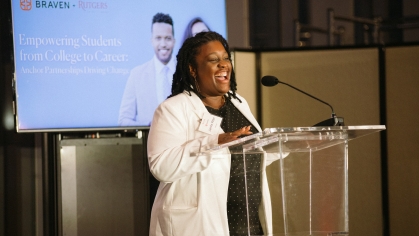Newark Mayor Ras Baraka will give the keynote speech at the April 26 "Equitable Growth in the City" conference hosted by Rutgers-Newark Center on Law, inequality and Metropolitan Equity (CLiME).
The event, held on campus at Rutgers Law School in Newark, convenes scholars, private sector leaders, and public officials to explore how cities can provide equal access to affordable housing and other resources, while avoiding the displacement and gentrification that often accompanies redevelopment. It will run from 9 a.m. to 4 p.m. at 123 Washington Street.
“A challenge for 21st century cities is how to foster economic growth that benefits all stakeholders—present and future residents, businesses and non-profit institutions—without worsening entrenched inequality,’’ said CLiME Director David Troutt. “Few cities have taken on this project like Newark.’’’
CLiME specializes in scholarship that examines the role of law and public policy in encouraging or inhibiting opportunity based on place. Much of its research is centered in Newark and neighboring towns and is completed in partnership with residents and municipal government.
The center’s latest report, titled ”Empowering Public Property,’’ will be presented at the conference, along with other studies. It outlines recommendations for how city-owned property can be used to add 2,500 units of affordable housing, cultivate more green space, and develop commercial space for local business owners and entrepreneurs to create jobs. It also offered suggestions for using public property to make healthcare services and healthier food more accessible.
A key part of CLiME’s mission is to propose concrete measures to address local problems, unlike much academic research, which often fails to make practical recommendations and remains disengaged from its subjects, according to Troutt.
“It’s important for a law school that is rooted in its community to act like an anchor institution, to roll up its sleeves and consider the work involved in implementing solutions,’’ he explained.
Over the years, CLiME has completed several reports focused on affordable housing and land use in Newark and neighboring Essex County cities, such as Irvington and East Orange.
Its data collection and recommendations have informed municipal redevelopment plans and regulations.
“It is a high honor to serve as keynote speaker at the center’s conference because it recognizes Newark’s achievements in removing barriers to housing, jobs, education, business development, and so many other areas, while increasing our exposure to the arts, nature and sustainability practices,’’ said Baraka.
“None of our progress happens in a vacuum. Newark works as an interwoven community. The national and global attention we receive makes me proud to serve alongside such resourceful, creative and inspired people,’’ he added.
The CLiME’s 2022 report “Who Owns Newark?” revealed that nearly half of Newark’s residential property was sold to anonymous corporate buyers, a model designed to enrich investors through returns from rent collection, and a nationwide trend that can displace residents and impede home ownership.
In response, Newark implemented several regulations, including deed restrictions on properties owned by the city, which require them to remain affordable for 30 years and give non-profit developers first right of refusal. Another measure requires more transparency and accountability from corporate owners.
CLiME’s “Empowering Public Property report” is based on an improved inventory of city-owned property the center completed last year in partnership with Newark, working to update records and consolidate information. Its recommendations
“We explored how the public asset of city-owned land can be used to solve longstanding city problems,’’ said Troutt. “It’s not just a set of vague academic recommendations. It’s grounded in grass roots, evidenced-based reality.’’
He added, “We went into this understanding what an incredible asset city owned property is. Newark has more because of economic precarity of many of its residents: a lot of property comes into city ownership through tax delinquencies and foreclosures. And the upside of that is that what began in economic tragedy can become the basis of economic triumph because using city-owned property subsidizes one of the greatest cost associated with development and that is land acquisition.’'
The April 26 conference will also include a tribute to Rutgers-Newark Chancellor Nancy Cantor, who ends her ten-year leadership role in July, when she will leave to become president of Hunter College in New York City.
The kind of publicly engaged scholarship produced by CLiME–which promotes solutions-oriented, community-based research and can have national and international impact–has been a hallmark of Cantor’s work at Rutgers-Newark.
Baraka expressed thanks to Cantor for steering the partnership between RU-N and the city.
“We build cooperation and collaboration into everything we do – and I want to take this opportunity to express my enormous gratitude for the unwavering support and encouragement of Chancellor Nancy Cantor, whom I count among Newark’s greatest allies and my closest friends,’’ he said.


